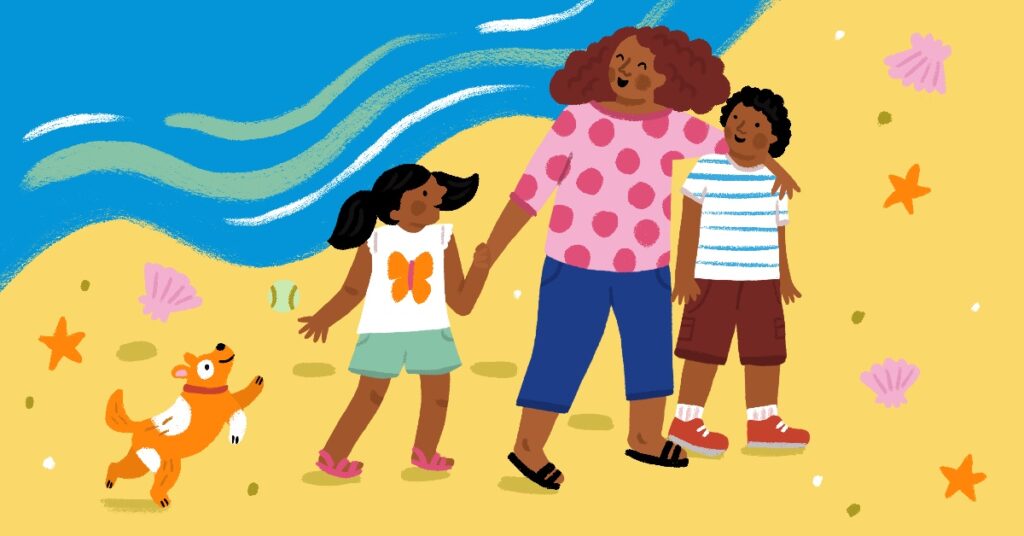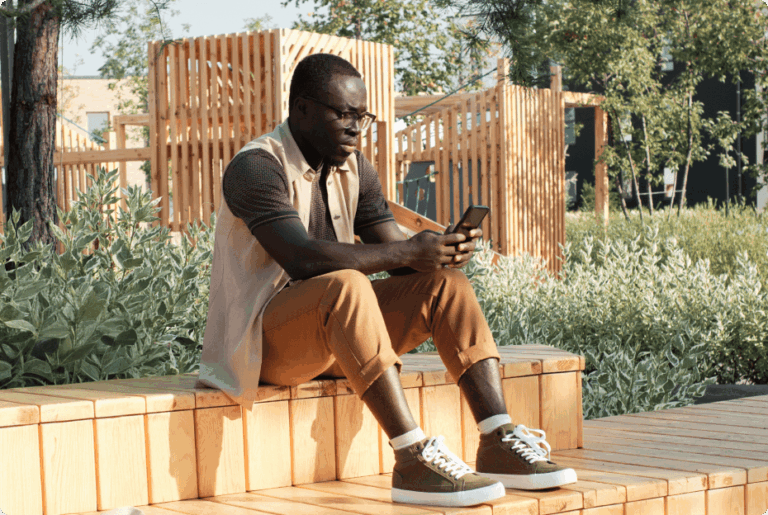
When Mayna McVey began feeling heart palpitations in 2020, she thought the cause was drinking too much tea.
“I didn’t recognize palpitations as anxiety right away until I went to my doctor. She asked me a series of questions and I scored moderate with anxiety and depression,” says McVey.
McVey started taking an anti-anxiety/depression medication, as well as focused on sleep, and increased her yoga and outdoor walks. While her efforts helped some, she still felt off.
“I constantly felt overwhelmed and kept telling my primary care doctor, ‘I feel like I’m a mess,’ which prompted her to evaluate me for ADHD,” McVey says.
Based on the evaluation, her doctor referred her to a specialist in August 2021, who diagnosed her with inattentive ADHD at 42 years old. Some of the questions McVey was asked, including the following, made her realize how her diagnosis connected to her life:
Are you constantly running late and losing track of time?
Do you often interrupt others or finish people’s sentences?
Do you find it hard to follow conversations and instructions?
“I thought ‘yes’ to all of those. I couldn’t believe I had never been asked these questions before,” says McVey.
She also learned that ADHD, depression and anxiety are all linked.
According to the Anxiety & Depression Association of America, adults with ADHD are likely to have other comorbid psychiatric disorders, such as an anxiety disorder or depression. In fact, about 50 percent of adults with ADHD also suffer from an anxiety disorder, reports the ADAA.
Often, anxiety and depression in those with undiagnosed ADHD come from having to work harder to keep up with people who don’t have ADHD, explains Mercedes Alice, a psychiatric nurse practitioner in Kenmore, Wash.
“Often those diagnosed with ADHD are above average intelligence or of high intelligence, so they are able to cope,” Alice says. “But even though they are able to cope, they are having to spend twice the amount of energy as the person who does not have ADHD, so a lot of the anxiety comes from feeling like you’re not keeping up.”
Alice says depression can arise from negative internal dialogue around feeling inadequate for not being able to function like others.
McVey can relate. She says for years she felt like something was wrong with her. She couldn’t figure out why she was chronically late, disorganized and unable to follow along during conversations.
“I thought it was a core personality flaw or that I was just bad at life. I didn’t understand that it was about the way my brain works,” she says.
Symptoms of ADHD — like inability to focus — are due to the brain working differently, explains Alice.
“Sometimes receiving an ADHD diagnosis and hearing this can bring relief and a ‘finally moment,'” Alice says. “But there is also a lot of grief that might happen when they realize that a lot of what they dealt with or struggled with in their past may have been ADHD.”
Processing the diagnosis
When McVey was diagnosed with ADHD, she was surprised but also felt relieved and understood in a way she hadn’t before. However, she also felt sadness and anger.
“I did regress and felt depressed,” she says. “I was just so sad and mad, looking back at that kid growing up and thinking if I was diagnosed earlier and had gotten the support that I have now, I would have grown up a lot more confident and came into my own power sooner.”
For instance, in retrospect, while she did well in school, she remembers always being the last student to finish tests. She also put a lot of hours into homework.
“My mom said I had to work harder than my brother did; things came easier to him.,” McVey says. “She noticed it because she lived with me, but I could hide it better from my teachers.”
She also recalls playing softball in high school and not knowing how many outs there were because her mind had wandered. In youth basketball, she remembers struggling to follow directions for plays because she was distracted or afraid to ask a coach to repeat something.
While she navigated childhood and most of her adulthood without an awareness of her ADHD, she says becoming a mother pushed her to take a hard look at how she was functioning.
“Before kids, I struggled, but I could keep those struggles under wraps and it didn’t unravel my life. Then having my first child, the sleep deprivation and relentlessness of parenthood was so overwhelming, and something you can’t really prepare for,” says McVey. “Adding my second child while having undiagnosed ADHD brought it all to another level.”
For instance, she remembers when her son was a baby and her daughter was in preschool. Changing his diaper as he wiggled uncontrollably, while getting her daughter ready for preschool, took all her attention and energy. All of it made it difficult to do much more that morning — like cook breakfast or care for herself in any way.
Even going on walks with other moms and their kids was stressful because they seemed to easily navigate between adult conversation and attending to their children.
“If I knew then that I struggled in these situations because of the way my brain works, I could have been way more forgiving with myself,” she says. “But I’d beat myself up. I could have advocated for myself to get extra help too.”
While ADHD explains why she navigates situations in a particular way, she says her diagnosis is not an excuse. Rather, it empowers her to address things differently in a way that makes them easier for her.
Finding ways to manage symptoms
While treatment for ADHD is unique to each person, medication, therapy and a combination of both may be used. Skill building can also be effective, Alice says.
“Having a therapist who knows neurodiversity (that human brains work in many different ways) can help with figuring out what coping skills work and don’t work for you,” Alice says. “Some people do great with lists or tracking things with calendars and others find these overwhelming.”
McVey is no longer taking anti-depression medication and is working to find the best ADHD medication and dosing for her. She also receives cognitive behavioral therapy from a therapist trained in ADHD, who uses a strength-based approach to help her focus on her gifts.
McVey says: “It helps me think about things this way: ‘Am I always a mess? No, my desk is messy now.’ So, I can look at things as how they are rather than tying them to my self-worth, which has really helped me cope. What helps me thrive is discovering the strengths I’ve always had, like seeing the big picture and the ability to hyper-focus when I’m interested in something.”
Here are some strategies and techniques McVey uses to cope with her ADHD symptoms:
- Keeping organized by changing things up
Before her diagnosis, McVey would find a system that kept things organized for a while, but then she couldn’t stick with it, making her feel like she was constantly failing. “Now I know that my brain will get bored with a ‘new system’ after a few weeks and that I need to change it up in order to keep my interest and motivation moving forward,” she says.
For example, she struggled to keep her kitchen desk cleared off. No matter how many hours she spent clearing papers and clutter, it would always pile up again. Then, after watching a few videos from Jessica McCabe’s YouTube channel “How To ADHD,” she realized she didn’t need her desk to function like a “normal” desk.
“Now the only things on the kitchen desk are our fish tank and coffee/tea maker. It doesn’t have room for papers anymore and I’ve found a new place to store those — which changes frequently,” McVey says.
- Clearing space for efficient cleanup
McVey says organizing things so that they are easy to put away also helps her keep things organized.
“So not filling a space, but leaving room on a shelf to see everything so it’s easy to put away and find. Having less means managing less. I’m still learning this every day, though,” she says.
- Bullet-journaling for time management
To manage time and prioritize to-do lists, McVey leans on the Bullet Journal method, which keeps all her ideas in one spot with a blank unlined journal and a pen.
“Instead of having multiple to-do lists (that) I can never find, bullet-journaling allows me to create an index as I go. So if I suddenly think of a house project I want to do — like hanging photos on my wall — I can create a list titled ‘House Projects’ and put that page number in my index so I can add to it anytime I want. It also forces me to write down a daily task list, where anything that doesn’t get done must be rewritten for the next day,” says McVey.
- Making asking for help OK
Parenting made McVey realize that asking for help was necessary to care for her children.
“I had a hard time just managing me — as a privileged single, white, cisgendered, heterosexual woman — but could hide my struggles much easier before kids,” she says.
After her diagnosis, she realized she spent a lot of time and energy hiding how hard parenting was for her. She avoided asking for help from those who cared about her most.
“Then burnout sets in and it is harder to crawl out of that hole rather than working on prevention,” McVey says. “I know now that I need to ask my partner and others for help when I start to feel overwhelmed.”
As McVey continues to process her diagnosis and find treatments and coping mechanisms that work for her, one thing stays constant: hope.
“As hard as it is to adjust to a diagnosis in my 40s — especially after so many years of negative dialogue in my head — I’m grateful knowing a strength-based approach is the key to living a joyful authentic life with ADHD,” she says.
Sources:
Jessica McCabe’s “How To ADHD”






